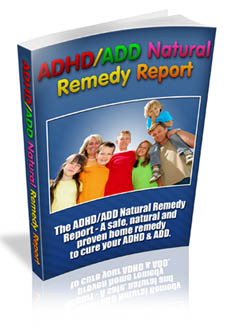There is no doubt that family counseling is helpful and educational for virtually every family wrestling with ADHD. Many parenting and communication skills can be learned and practiced. This therapy almost always helps the ADHD child, the parents, and the siblings learn ways to effectively communicate and cope during this potentially lifelong process of dealing with and managing ADHD. I would recommend this for all my ADHD families in my practice. Beyond family counseling, there are a number of psychological or psychiatric therapies (e.g., behavioral or cognitive therapies or biofeedback) that have been utilized with ADHD.
However, before beginning any therapy, be it behavioral or medication, the physician, parent, and patient should be very clear about the behaviors they are targeting for change - and those that are safe to leave alone. Since physicians have no way of predicting how any particular patient will respond to any particular therapy, all therapies for ADHD will involve a form of experimentation - a form of trial and error - to see what works and what does not. These trials will require your close observation and supervision. If one trial doesn't work, don't worry; there will be dozens of other options to consider.
Some ADHD experts use a purely behavioral strategy, and many parents can successfully help themselves and their ADHD children cope and succeed using behavioral principles and techniques alone. Further, some of these behavioral treatments have shown promise in early research. Treatment Of Adhd In Children With Tics
There is certainly no harm in trying behavioral techniques prior to a trial of medication, and many of my patients have preferred such an approach. If you'd like to learn more, talk to a professional who is familiar with these approaches. But be aware that there are potentially harmful therapies to watch out for.
For example, according to Dr. Bill Maier, "One of the disturbing scams I'm aware of is the aggressive marketing being done by a large chain of biofeedback clinics. Their advertising uses scare tactics to prey on parents' fears about medication, and they charge huge fees for their treatment program. To my knowledge, there is no empirical validation that biofeedback therapy is effective in treating ADHD. Many parents are duped into spending their entire savings on this unproven treatment."
Behavioral Therapies
A group of researchers has systematically reviewed the evidence for the effectiveness of a variety of behavioral therapies. These authors looked at 58 studies that met their inclusion criteria. The results indicated that one specific form of behavioral therapy, cognitive behavioral treatment (CBT), does not improve the behavior or academic performance of children with ADHD.
There are several different children with different forms of CBT, but all without emphasize the ability of people to make changes in their lives without having to understand why the change occurs.
However, several specific psychological behavioral treatments that use the techniques and principles of behavior modification have consistently shown a benefit on behavior in medical studies. Beth Bruno explains, "The principles of behavior modification describe a formalized method that observes behavior and seeks to shape it in positive ways.
The purposes of behavior modification in the education of children are not brainwashing, bribery or mind control. Quite the contrary. The purposes are to encourage children to experience the consequences of their actions in order to increase independence and self-discipline." There are many different forms and types of behavior modification available.
Of great interest are the studies that look at the combined treatments consisting of a prescription drug and a behavioral intervention. One systematic review of the medical literature by Miller and his colleagues looked at the effectiveness of combined treatments on ratings of behavior and identified three studies that met their inclusion criteria.
The results, in this review, indicated that combined treatments did not differ significantly from medication alone.
Jadad and his colleagues also reviewed the effectiveness of combination treatments. The results were similar to those obtained by Miller, as four of five studies showed little difference between combined treatments and stimulants alone. Treatment Of Adhd In Children With Tics
This does not mean that families dealing with ADHD should not obtain family counseling. Rather, it means that formal behavioral therapy may be no better than medication alone. Therefore, many parents could, in good conscience, choose one option or the other. Some studies show that the addition of intensive behavioral treatment to stimulant medication may provide some modest additional benefit.
But, whether you choose medication and/or behavioral therapy, a survey of more than 500 parents from the New York University Child Study Center showed that children with ADHD may not be particularly compliant with either.
The survey showed:
- Nearly 9 in 10 of these parents said that their children had been given medication to treat ADHD, but only about 50 percent of these kids were currently taking anything. The reasons? Nearly all these parents feared their children wouldn't receive the right dose of medicine at school and many said their children complained of side effects. Fortunately, we have a number of newer, longer-acting medications, which may dramatically reduce this particular problem.
- Nearly half of the parents who had children with ADHD said that behavior therapy had been recommended for their kids. But only 21 percent reported that their children actually participated in behavior therapy.
Furthermore, for children with the more severe forms of ADHD, there may be a significant risk of what the researchers call "school failure," One study followed a birth cohort of 1,265 children from an urban region of New Zealand until age 18 years. Unfortunately, no formal diagnoses of attention deficit hyperactivity disorders were made, but the children were divided at age eight years into five groups with increasing attention difficulties, based on a behavioral rating scale. Children in the highest group of attention difficulties showed the highest proportion of school failures (60 percent) by age 18.
To learn more about ADHD, you have to get Treatment Of Adhd In Children With Tics right away!

